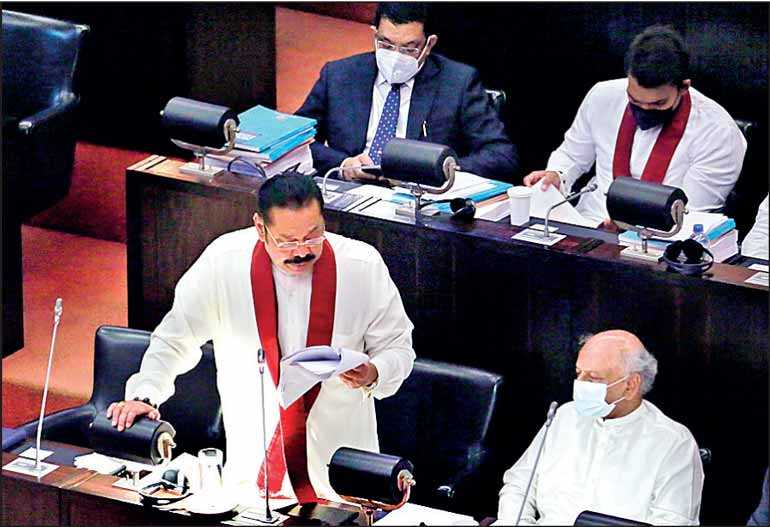Sunday Feb 15, 2026
Sunday Feb 15, 2026
Wednesday, 18 November 2020 00:00 - - {{hitsCtrl.values.hits}}

By Chandani Kirinde
Prime Minister Mahinda Rajapaksa presented what he described as a “development Budget” for 2021 to Parliament yesterday aimed at steering Sri Lanka to 5.5% growth in 2021 and overcoming the severe setbacks to the COVID-19-hit economy.
Presenting the Government’s first Budget since its election in August and President Gotabaya Rajapaksa’s election last November, the Prime Minister said the medium term vision of the new administration was to reduce the Budget deficit through increasing the economic growth up to 6% over the medium term and increasing Government revenue from its current level of 9.7% to 14.1%. However, in Budget 2021 the deficit will be 8.9%, up from 7.9% in 2020.
“This is a development Budget presented to elevate an economy that has been shattered. It covers all sectors under a macroeconomic vision aimed at fulfilling the ‘Vistas of Prosperity and Splendour’. This is a Budget that will open up numerous special investment opportunities to our business community for production of local goods and services under the competitive setting of the global economy,” Rajapaksa, who is also the Minister of Finance, said.
The estimated Government Revenue for 2021 is Rs. 1,961 billion while the total Government expenditure is Rs. 3,525 billion and as such the difference between the revenue and the expenditure is Rs. 1,564 billion.
Rajapaksa said the Government plans to maintain the Budget gap at 9% of the GDP since the private investments which amounted to 32.3% of GDP in 2014 has decreased up to 27.6% in 2019 and since it is required to provide a robust start to revive the economic growth which had been stagnating of late.
“I believe we can manage this Budget deficit, due to enhanced opportunities to reissue local and international currency denominated debt at maturity. By 2025, the Budget deficit is targeted to be 4% due to growth in tax revenue through the expansion of the economy and the trust placed on the management of public expenditure and public enterprises,” he said.
“Interrelated development proposals presented under this Budget are appropriate for rural as well as urban settings, traditional as well as modern contexts, micro financial as well as capital market objectives will lead to an increase of the present low level of economic capacity utilisation,” he said.
The Prime Minister also reached out to tax evading entrepreneurs to utilise their hidden funds and invest in the country.
“For the benefit of the country, I request from all entrepreneurs to utilise the funds hidden locally or internationally in order to evade laws relating to taxes and foreign exchange,” he said, adding that the Government expects to make legal provisions to provide a tax pardon to entrepreneurs who use such funds for any investment facilitated by this budget under the payment of taxes amounting to 1%.
The Prime Minister announced that the Value Added Tax (VAT) will remain unchanged at 8%, for businesses with a turnover of more than Rs. 25 million per month engaged in the import and manufacture of goods or provision of services, except in the case of banking, financial and insurance sectors.
He said the efficiency of tax collection will be improved through the introduction of an online-managed single Special Goods and Service Tax in place of the various goods and service taxes and levies, imposed under multiple laws and institutions on alcohol, cigarettes, telecommunication, betting and gaming and vehicles, which accounts for 50% of the income from taxes and levies.
Personal Income Tax will apply on earnings from employment, rent, interest, dividends, or any other source only if it exceeds Rs. 250,000 per month. Withholding tax on rent, interest or dividends and the PAYE tax (Pay As You Earn) and taxes on interest have been abolished.
Profits and income earned by any person from farming including agriculture, livestock and fish farming, with effect from 1 April 2019 will be exempted from income tax.
The Prime Minister also announced the creation of a techno-entrepreneur-led economy that will contribute to the increase of exports and foreign earnings from the technology field and broaden the knowledge and professional services to the national economy within the next two years. Towards this, Rs. 10,000 million is being allocated from the Budget to develop these Techno Parks as eco-friendly new cities connected to the expressway network and other infrastructure facilities.
He also announced concessions for the COVID-19-hit tourism industry saying the sector can be developed in the short run by tapping into the domestic tourism sector which has otherwise spent almost $ 1.5 billion per annum for foreign travel.
He said the Government will extend the concessions and recovery of loans granted under the re-financing facilities of the Central Bank of Sri Lanka until 30 September 2021 and proposed to provide the banks with a Treasury guarantee covering 50% of such loans while simplifying the taxes and fees levied by the Local Government Institutions on those engaged in the sector.
The Prime Minister also said the tourism, foreign and commercial activities of the first phase of the Colombo Port City is scheduled to be commence in 2021 and that he expects to present to the Parliament a new legal framework conducive to promote commercial services and investment in this Special Economic Zone in January after the Budget debate.
“This Economic Zone provides for extensive employment opportunities for Sri Lankans and earning even in foreign currencies. We believe that the Colombo Port City will become a prime choice for investors and business community due to the business and investor friendly legal framework and proposed advanced infrastructure.
“It is expected to provide concessions on required taxes and specific goods trade, banking, and foreign exchange with the objective of converting the Port City Economic Zone as one of the hubs for investment promotions in the country,” he said.
